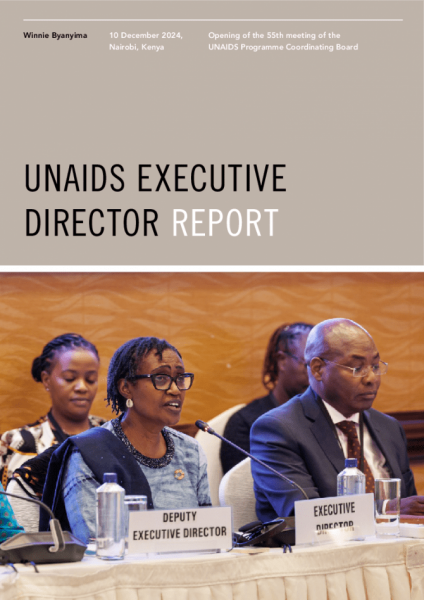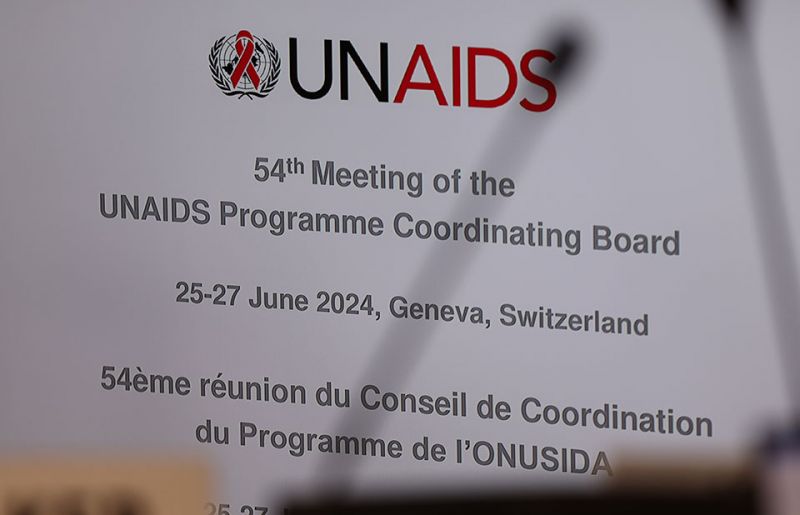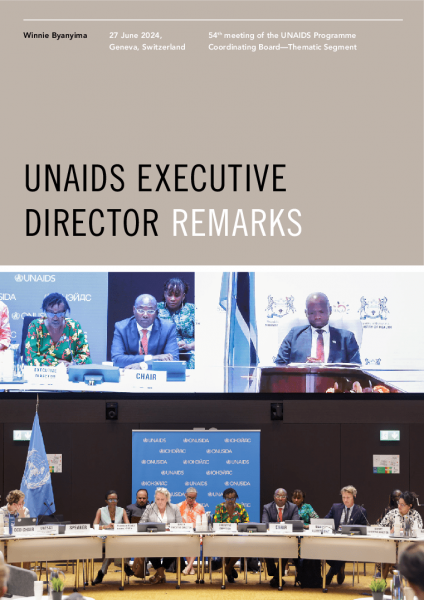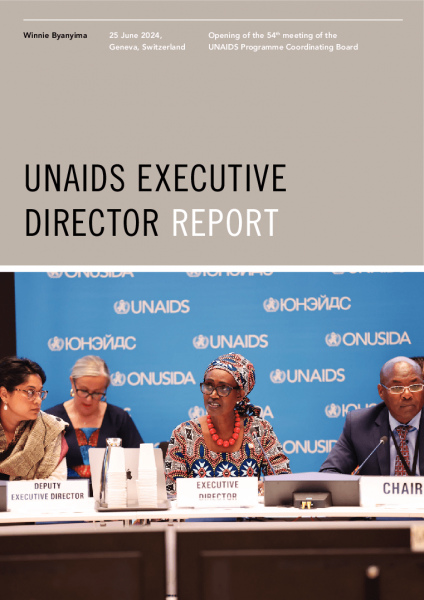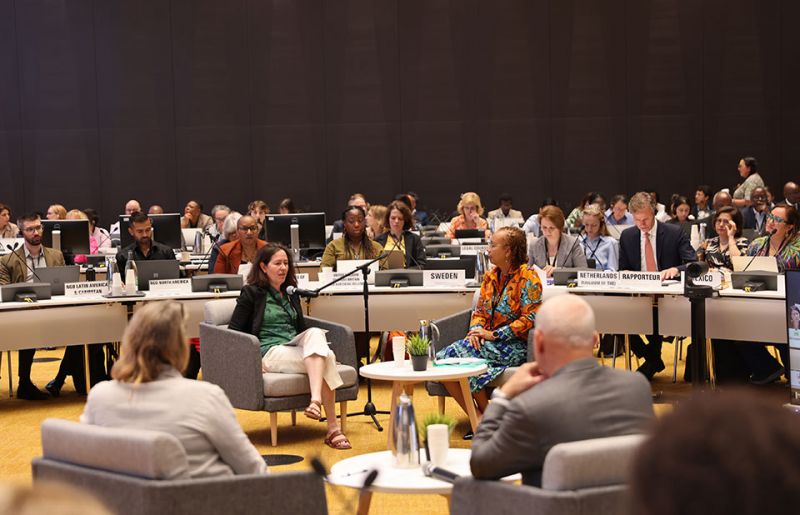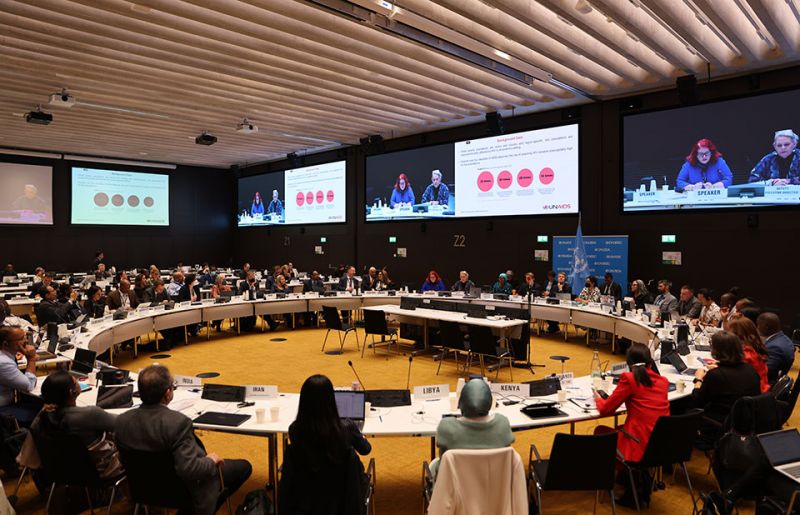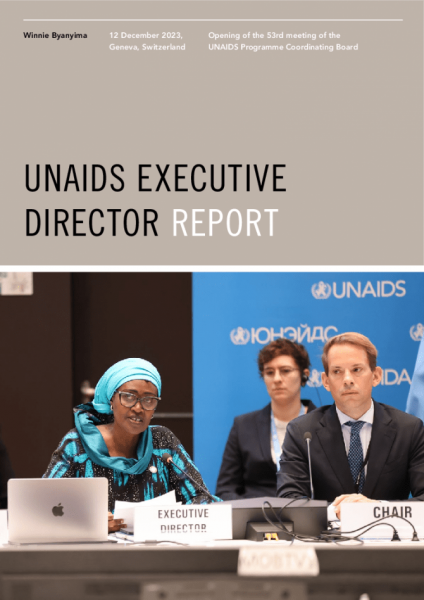GENEVA, 27 June 2024—At the 54th meeting of UNAIDS’ Programme Coordinating Board (PCB) which concluded today in Geneva, Switzerland, governments, civil society and United Nations agencies united in a shared commitment to accelerate progress to meet the 2025 AIDS targets and sustain the gains of the global HIV response toward 2030 and beyond.
In her opening remarks to the meeting, the Executive Director of UNAIDS, Winnie Byanyima, highlighted the urgency of accelerating progress to meet the 2030 target of ending AIDS as a public health threat. “The world has six years to reduce new HIV infection rates, expand antiretroviral treatment, and reduce AIDS-related deaths, but only 18 months to reach the 2025 targets which will determine whether or not countries will be able to end their pandemics by 2030.”
She warned that there was ‘nothing sustainable about an expanding pandemic’ and called on members to join UNAIDS in ‘throwing everything we can’ at HIV prevention, making medicines and health technologies for HIV prevention and treatment equitable, affordable and accessible, and building stronger health systems’.
“We have a choice,” said Ms Byanyima. “We can accelerate now, drive rates down, and succeed. Or we can get distracted, focus only on what we’ve gained so far, and miss the opportunity to end AIDS. We must accelerate in order to sustain.”
She noted that sustainability also requires progress on widening fiscal space and addressing indebtedness of low- and middle-income countries, protecting human rights and gender equality, and called on all partners and allies to embrace a ‘bold vision of sustainability—one capable of ending the AIDS pandemic.’
Ms Byanyima emphasised the funding constraints which are hampering progress in the AIDS response highlighting the US$ 8.5 billion shortfall in funding for HIV. In 2022, US$ 20.8 billion was available for HIV funding in low- and middle-income countries whereas the estimated need by 2025 is US$ 29.3 billion. She called on all donors to ensure that the Joint Programme is fully funded to the agreed minimum levels of US$ 160 million for 2024.
On the opening day of the meeting Germany announced that it would be increasing its funding to UNAIDS. “Germany has decided to increase its contribution to UNAIDS in 2024 by € 2 million, from € 4.75 million in 2023 to € 6.75 million. We trust that this decision shall contribute to the minimum budget requirements of US$ 160 million to ensure that UNAIDS can adequately implement its workplan and budget,” said Binod Mahanty, Senior Policy Advisor, Federal Ministry of Health of Germany.
The Board reviewed the performance of the Joint Programme and appreciated the wide scope and in-depth contribution of UNAIDS to the global AIDS response at the global, regional and country levels.
The critical role of communities in continuing to lead the way in responding to HIV was highlighted as central to sustainability of the HIV response, which was the focus of the thematic segment on the final day: Sustaining the gains of the global HIV response to 2030 and beyond.
Ms Byanyima said, “To end AIDS, the foundation must be people living with HIV, civil society and communities. They are indispensable and non-negotiable for ending the pandemic, sustaining the response and ensuring accountability for all.
Florence Riako Anam, Co-Executive Director of the Global Network of People Living with HIV (GNP+), gave a powerful keynote address during the thematic session, she said, “People living with HIV will be here in 2031. For us, the sustainability of the HIV response is a journey of transformation and not a destination with an end date.” Other keynote speakers included H.E. Edwin Dikoloti, Minister of Health of Botswana and the Former President of the Republic of Chile Michelle Bachelet.
Ahead of the PCB, building on its longstanding partnership with the Global Fund to Fight AIDS, TB and Malaria, UNAIDS signed a new strategic framework for cooperation and collaboration to end AIDS. Joining the PCB discussions the Director of the Global Fund, Peter Sands said, “Optimizing HIV and primary health care integration requires well-coordinated partnerships between governments, private sector companies, international organizations, and non-government organizations.”
John Nkengasong, U.S. Global AIDS Coordinator and head of PEPFAR, said that gains were fragile and need to be sustained. "2030 is critical because at that point the global community either says ‘we have done our best and we don’t know what else to do’ or do we say, ‘YES! we can get to the finish line’...2030 is a mountaintop moment.” He also called for UNAIDS to be fully funded to continue its life-saving work.
The Board meeting provided an opportunity for UNAIDS to announce a new high-level panel on a resilient and fit-for-purpose UNAIDS Joint Programme. The Panel will consider the evolution of the pandemic and the global response as well as the evolving country needs within the overall context of the Joint Programme’s mandate.
This week also saw the release of a new report by on Drug Use, Harm Reduction and the Right to Health, demonstrating the public health necessity of moving away from punitive approaches to people who use drugs – a step towards ensuring access to health care for marginalized communities.
The 54th PCB was chaired by Kenya, represented by Harry Kimtai, Principal Secretary, State Department for Medical Services, Nairobi, with Brazil serving as the Vice-Chair and Netherlands as Rapporteur. The Report to the Board by the UNAIDS Executive Director, and the reports for each agenda item and the PCB’s decisions can be found at: 54th UNAIDS Programme Coordinating Board.
The 55th meeting of the PCB will take place 10-12 December 2024, in Nairobi, Kenya.
UNAIDS
The Joint United Nations Programme on HIV/AIDS (UNAIDS) leads and inspires the world to achieve its shared vision of zero new HIV infections, zero discrimination and zero AIDS-related deaths. UNAIDS unites the efforts of 11 UN organizations—UNHCR, UNICEF, WFP, UNDP, UNFPA, UNODC, UN Women, ILO, UNESCO, WHO and the World Bank—and works closely with global and national partners towards ending the AIDS epidemic by 2030 as part of the Sustainable Development Goals. Learn more at unaids.org and connect with us on Facebook, Twitter, Instagram and YouTube.



